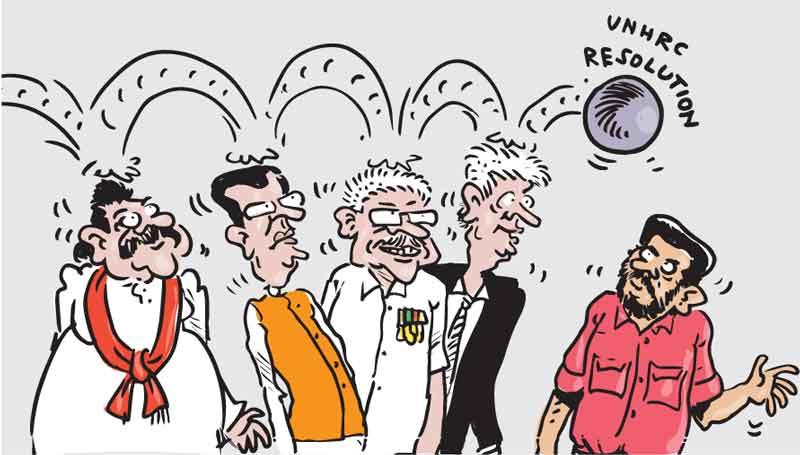The new government of President Anura Kumara Dissanayake (AKD) is encountering or is going to encounter several dilemmas some of which threaten its very survival, despite the ruling National People’s Power (NPP) or the main constituent of it, Janatha Vimukthi Peramuna (JVP) having not been responsible for them.
Planning and executing the economic growth so that the country would be able to repay the foreign debt from 2028, meting out justice to the victims of the Easter Sunday terrorist attacks, finding a lasting solution to the ethnic problem, handling the human rights/war crimes allegations at the United Nations Human Rights Council (UNHRC) are some of them.
The Easter Sunday carnage has come to the fore these days after former Parliamentarian Udaya Gammanpila demanded the government to release two reports of committees appointed by former President Ranil Wickremesinghe on the terror attacks. One of the reports – the one dealing with the allegation by the Britain’s “Channel 4” – had been in the custody of Wickremesinghe since June this year.
The Catholic Church seems to be not happy about the new developments. Director of Communications for the Archdiocese of Colombo Fr. Cyril Gamini Fernando had requested politicians not to attempt to take political mileage from the incident in which nearly 300 innocent people were killed. However, it is clear that the matter is going to be further politicised and to drag on for years, if not for decades.
Another similar long drawn issue is the allegations by the UNHRC on human rights/violations which no government has been able to resolve. These allegations are being levelled against both the belligerent parties of the ethnic conflict in Sri Lanka, the armed forces and the liberation Tigers of Tamil Eelam (LTTE), from the days of the war between the two groups. And the UNHRC is involved in the matter since 2009, the year in which the war ended.
On May 22, 2009, three days after the end of the war, the then United Nations Secretary- General (UNSG), Ban Ki-moon paid a two-day visit to Sri Lanka. During a joint media conference with the UNSG, the then President Mahinda Rajapaksa agreed to a suggestion by the UNSG to initiate an accountability process on the allegations of human rights violations in the country. And in the same year Sri Lanka brought a resolution in the UNHRC which was unanimously passed endorsing the outcomes of the media briefing.
After a year, when the Sri Lankan government was dragging its feet on the matter the UNSG appointed a panel to advise him on the next step. President Rajapaksa, with a view to circumvent the UN move appointed the Lessons Learnt and Reconciliation Commission (LLRC) in the same year (2010). The Panel which was generally called in Sri Lanka the Darusman Committee and the LLRC presented their report in 2011, with the former levelling serious allegations against the armed forces and the LTTE on human rights violations.
The United States, along with some other countries presented a Resolution on Sri Lanka at the March 2012 Regular Session of the UNHRC. This was first Resolution on Sri Lanka’s human rights situation initiated by the other members of the HN human rights body. It was a simple resolution which just demanded the implementation of the Sri Lanka’s own LLRC, but only to be rejected by Sri Lanka. The subsequent years saw the passage of new annual resolutions on the country at the UNHRC which seemed to be gradually toughening and gathering more allegations.
The Resolution passed in 2021 empowers the office of the UNHR Commissioner “to collect, consolidate, analyse and preserve information and evidence and to develop possible strategies for future accountability processes for gross violations of human rights or serious violations of international humanitarian law in Sri Lanka.” It is aimed at taking legal action against the political and military leaders of Sri Lanka who are accused of violation of human rights.
Fifteen years have passed since the end of the war and still the leaders of the country are following the same strategy- rejecting the resolutions. And the UN body has also been threatening the leaders with legal action with an ever toughening tone. The new government has to find a way to end this cycle.


